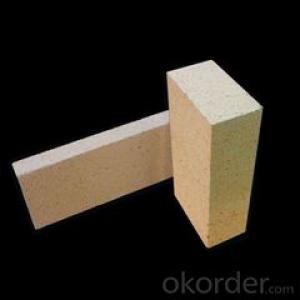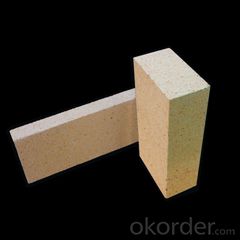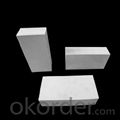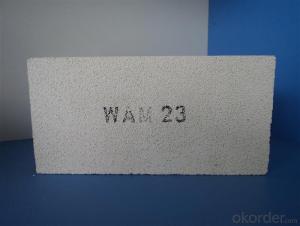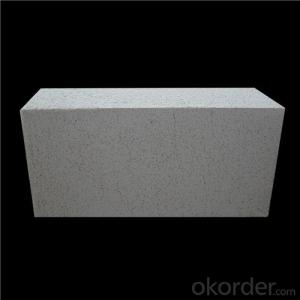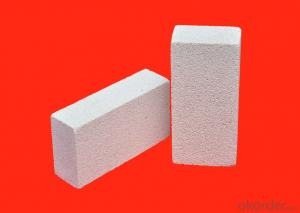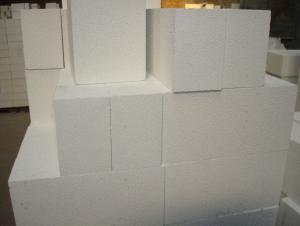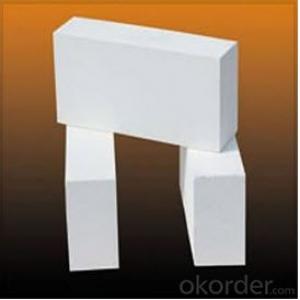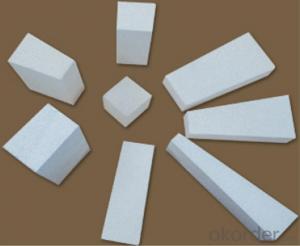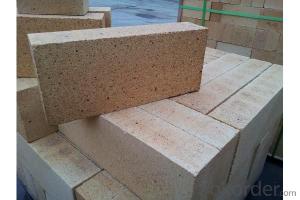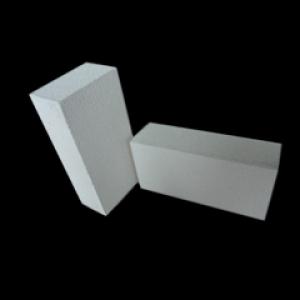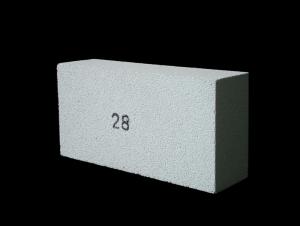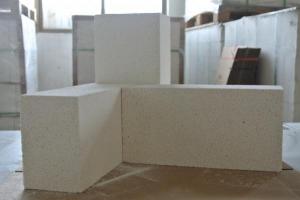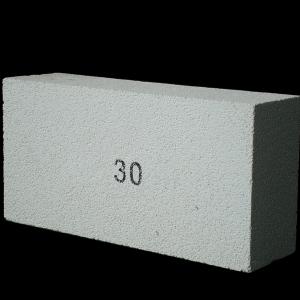Insulating Fire Brick - Mullite Lightweight Refractory White Brick
- Loading Port:
- Shanghai
- Payment Terms:
- TT OR LC
- Min Order Qty:
- 10 m.t.
- Supply Capability:
- 100 m.t./month
OKorder Service Pledge
OKorder Financial Service
You Might Also Like
Quick Details
| Place of Origin: | Brick | Refractoriness (Degree): | Common (1580°< Refractoriness< 1770°) | |
| Brand Name: |
Packaging & Delivery
| Packaging Detail: | 1.fumigated wooden pallet with polyethylene film and steel straps 2.as customers' requirements |
| Delivery Detail: | according to the contracts |
Product Description
Mullite brick is a kind of product made of best quality mullite. This product has features of good
chemical stability, high load softening temperature and good thermal shock stability, etc. It is an important kind of refractory product used in metallurgy, construction material, electric industries, etc.
Sintered Mullite Brick | |||
M-65 | M-75 | M-80 | |
Al2O3 (%) | 65 | 75 | 80 |
Refractoriness (℃) | 1850 | 1850 | 1850 |
Apparent Porosity (%) | 19 | 20 | 21 |
Bulk Density (g/cm3) | 2.5 | 2.6 | 2.7 |
Refractoriness Under Load (℃) | 1580 | 1600 | 1630 |
Atmospheric Pressure Strength(MPa) | 55 | 60 | 60 |
Light Weight Heat Insulation Brick | |||
MD-1300 | MD-1450 | MD-1550 | |
Al2O3 (%) | >40 | >50 | >65 |
SiO2 (%) | 55-60 | 40-50 | 30-35 |
Fe2O3(%) | <1 | <1 | <1 |
Host Lattice | Mullite | Mullite | Mullite |
Thermal Conductivity(w/m.k 400℃) | 0.2-0.3 | 0.2-0.3 | 0.3-0.35 |
Bulk Density (g/cm3) | 0.8-0.9 | 0.8-1.0 | 1.0-1.2 |
Atmospheric Pressure Strength (MPa) | ≥2.5 | ≥3.0 | ≥5.0 |
Refractoriness Under Load (KD℃) | >1300 | >1410 | >1520 |
Safe Working Temperature (℃) | 1300 | 1450 | 1550 |
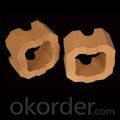
Our Services
1. We will reply to you immediately.
2. Our products will be made according to your index.
3. Other details could be discussed according to customers’ requirements.
FAQ
1. What’s the payment?
Usually T/T, others could be discussed.
2. When will you deliver the goods?
The delivery time will be determined according to the quantity of the order.
3. Do you provide samples?
Yes, samples are available.
4. How are your products’ quality?
The products will be strictly inspected before shipment, so the quality could be guaranteed.
5. Do you accept OEM?
Yes, we can do OEM.
- Q: Can insulating fire bricks be used in cryogenic applications?
- Insulating fire bricks, also known as refractory bricks, serve primarily for high-temperature purposes and find common usage in furnaces and kilns. Nonetheless, when it comes to cryogenic applications involving extremely low temperatures, insulating fire bricks may prove to be unsuitable. Cryogenic temperatures, usually below -150 degrees Celsius (-238 degrees Fahrenheit), present distinctive challenges for materials due to the severe thermal stresses they endure. Insulating fire bricks typically consist of materials like alumina and silica, which possess limited resistance to thermal shock and can become brittle at exceedingly low temperatures. This brittleness exposes them to the risk of cracking and failure under cryogenic conditions. Furthermore, insulating fire bricks exhibit relatively high thermal conductivity, implying that they conduct heat rather efficiently. In cryogenic applications, where minimizing heat transfer is of utmost importance, materials with lower thermal conductivity are preferred. Consequently, insulating fire bricks, with their higher thermal conductivity, may not be the most effective choice for cryogenic applications. Instead, materials with exceptional thermal insulation properties and low thermal conductivity, like aerogels or foams made from silica or carbon, are often favored for cryogenic applications. These materials offer superior thermal insulation and better resistance to extreme temperatures, ensuring efficient and dependable performance in cryogenic environments. In conclusion, while insulating fire bricks find suitability in high-temperature applications, they may not be the optimal selection for cryogenic applications due to their brittleness at low temperatures and relatively high thermal conductivity. Materials specifically designed for cryogenic conditions, such as aerogels or foams, prove to be more suitable for these extreme temperature environments.
- Q: Are insulating fire bricks suitable for use in high-temperature chimneys?
- Yes, insulating fire bricks are suitable for use in high-temperature chimneys. These bricks are designed to withstand extreme heat, making them an ideal choice for insulation purposes in chimneys where temperatures can reach high levels. Insulating fire bricks provide excellent thermal resistance and insulation properties, ensuring the safety and efficiency of high-temperature chimneys.
- Q: Can insulating fire bricks be used as a lining for boilers?
- Yes, insulating fire bricks can be used as a lining for boilers. Insulating fire bricks are designed to withstand high temperatures and have excellent thermal insulation properties. They are commonly used in applications where heat retention and energy efficiency are important, such as in industrial boilers. The insulating properties of these bricks help to reduce heat loss and increase the efficiency of the boiler. Additionally, their durability and resistance to thermal shock make them suitable for use in boiler linings, where they can withstand the extreme conditions and fluctuations in temperature.
- Q: Can insulating fire bricks be used in the construction of flue liners?
- Yes, insulating fire bricks can be used in the construction of flue liners. Insulating fire bricks are designed to withstand high temperatures and provide excellent insulation properties. These bricks are made from lightweight materials such as vermiculite or perlite, which have low thermal conductivity. This makes them ideal for lining flues, as they can help to retain heat and improve the efficiency of the flue system. Additionally, insulating fire bricks are resistant to thermal shock and can withstand rapid temperature changes, which is important in flue applications where the temperatures can fluctuate significantly. Overall, using insulating fire bricks in the construction of flue liners can help to enhance the performance and safety of the flue system.
- Q: Are insulating fire bricks suitable for thermal insulation in boilers?
- Insulating fire bricks prove to be a suitable option for thermal insulation in boilers. They are specifically engineered to possess exceptional insulating abilities, enabling them to efficiently diminish heat transfer in environments with high temperatures, like boilers. These bricks are crafted from lightweight materials and possess a low thermal conductivity, thus rendering them highly suitable for applications related to thermal insulation. By incorporating insulating fire bricks in boilers, energy efficiency can be enhanced by minimizing heat loss and ensuring optimal utilization of the boiler-generated heat. Moreover, these bricks exhibit remarkable resistance to elevated temperatures and can endure the harsh conditions prevalent within a boiler, thereby establishing themselves as a dependable choice for thermal insulation.
- Q: Can insulating fire bricks be used in thermal power plants?
- Yes, insulating fire bricks can be used in thermal power plants. These bricks are designed to withstand high temperatures and provide excellent insulation, making them suitable for use in power plants where heat is generated and thermal efficiency is crucial. They help to reduce heat loss, improve energy efficiency, and maintain a stable and controlled environment within the power plant.
- Q: Can insulating fire bricks be used in the insulation of boilers?
- Yes, insulating fire bricks can be used in the insulation of boilers. These bricks are designed to withstand high temperatures and provide excellent thermal insulation, making them ideal for use in boilers to minimize heat loss and increase energy efficiency.
- Q: Are insulating fire bricks resistant to electrical conductivity?
- Yes, insulating fire bricks are resistant to electrical conductivity. These bricks are made from materials that have low electrical conductivity, such as ceramic fibers or insulating refractory materials. The main purpose of insulating fire bricks is to provide thermal insulation, making them ideal for applications where high temperatures need to be contained. As a result of their low electrical conductivity, insulating fire bricks do not conduct electricity and are used to line electrical furnaces, kilns, and other high-temperature equipment where electrical insulation is required.
- Q: Can insulating fire bricks be used in cement kilns?
- Indeed, in cement kilns, insulating fire bricks find their utility. These bricks are specifically engineered with a low thermal conductivity, rendering them an excellent choice for insulating environments that endure high temperatures, like cement kilns. By employing these bricks, heat loss can be minimized, thereby enhancing energy efficiency within the kiln. Furthermore, their lightweight composition facilitates ease of handling and installation in the kiln. Nevertheless, it is crucial to carefully select insulating fire bricks that align with the unique operating conditions and demands of the cement kiln to guarantee utmost performance and durability.
- Q: Can insulating fire bricks be used as insulation for pizza ovens?
- Yes, insulating fire bricks can be used as insulation for pizza ovens. Insulating fire bricks are designed to withstand high temperatures and provide excellent thermal insulation. These bricks have low thermal conductivity, meaning they can effectively retain heat and prevent it from escaping the oven. This helps in maintaining a consistent and high temperature inside the pizza oven, allowing for even cooking and crisp crusts. Insulating fire bricks are also lightweight and easy to install, making them a popular choice for insulating pizza ovens.
Send your message to us
Insulating Fire Brick - Mullite Lightweight Refractory White Brick
- Loading Port:
- Shanghai
- Payment Terms:
- TT OR LC
- Min Order Qty:
- 10 m.t.
- Supply Capability:
- 100 m.t./month
OKorder Service Pledge
OKorder Financial Service
Similar products
Hot products
Hot Searches
Related keywords
